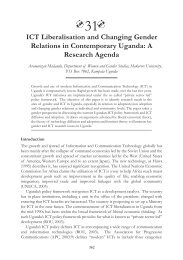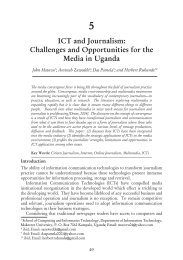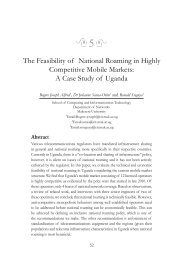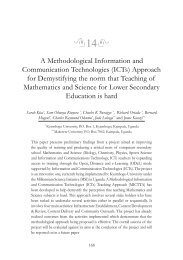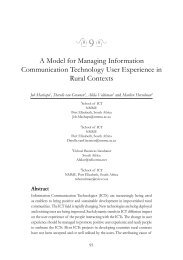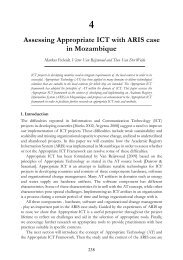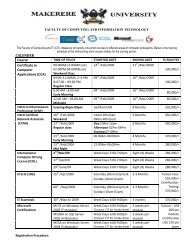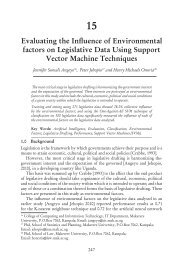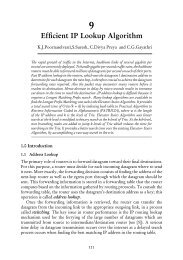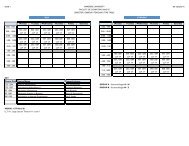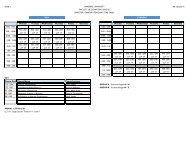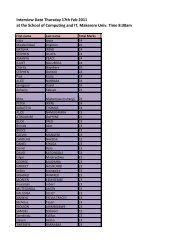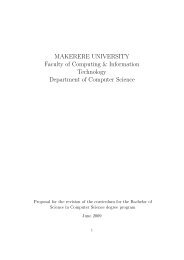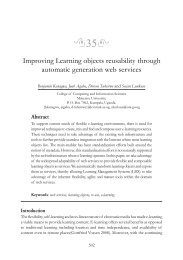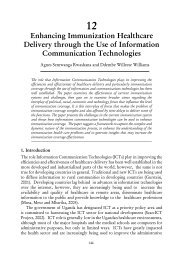Undergraduate Handbook - School of Computing and Informatics ...
Undergraduate Handbook - School of Computing and Informatics ...
Undergraduate Handbook - School of Computing and Informatics ...
You also want an ePaper? Increase the reach of your titles
YUMPU automatically turns print PDFs into web optimized ePapers that Google loves.
<strong>of</strong> computers; competently use the common <strong>of</strong>fice applications in at least two operating systems <strong>and</strong> competently<br />
use common text editor in at least two operating systems.<br />
Indicative Content: General computer organisation; Historical perspectives <strong>of</strong> computing; common Micros<strong>of</strong>t<br />
<strong>of</strong>fice packages; <strong>of</strong>fice packages in other operating systems; text editors; Common Linux <strong>and</strong> Using the web.<br />
Reference Books:<br />
i. J. Preston, R. Ferret <strong>and</strong> S. Gaskin, Computer Literacy, 2007.<br />
ii. J. Janrich <strong>and</strong> D. Oja, Practical Computer Literacy, 2001.<br />
CSK 1101 Communication Skills (4 CU)<br />
Course Description: This course provides students with skills <strong>of</strong> effective communication. These include verbal,<br />
written, <strong>and</strong> gesture. The course aims at facilitating students appropriately <strong>and</strong> clearly communicate with others. The<br />
aims <strong>of</strong> the course unit are to: Improve the communication competencies <strong>of</strong> the student; Improve problem solving<br />
strategies <strong>of</strong> students; improve the art <strong>of</strong> critical thinking within the student; improve the student’s ability to collect<br />
<strong>and</strong> synthesize information; provide students with knowledge to utilize the library <strong>and</strong> other educational resources.<br />
Indicative Content:<br />
• Writing Skills: Thinking critically/selectively before the writing process; selecting the relevant details;<br />
organizing the relevant details logically; writing the reports essays, letters <strong>and</strong> taking notes in appropriate<br />
register; avoiding ambiguities, fallacies, irrationalities; providing supportive evidence; editing documents,<br />
pro<strong>of</strong> reading; writing <strong>and</strong> exp<strong>and</strong>ing information; Quoting <strong>and</strong> citing references; writing a curriculum<br />
vitae.<br />
• Reading Skills: The use <strong>of</strong> skimming; scanning inference <strong>and</strong> prediction in reading; Intensive <strong>and</strong> critical<br />
reading; Acquisition <strong>of</strong> specific reading skills; Interpretation <strong>of</strong> non linear texts; Locating information <strong>and</strong><br />
comprehension.<br />
• Speaking <strong>and</strong> Listening Skills to Enhance Effective Public Relations: The art <strong>of</strong> persuasion in effective<br />
speaking; Conducting interviews; Conducting meetings; Participating in group discussions <strong>and</strong> tutorials;<br />
Non verbal communication clues; Presentation seminars, seeking clarification etc.; Expression <strong>of</strong><br />
politeness; Public speaking; Proper listening skills.<br />
• Examination Skills; Preparing for examinations: How much one gets from group discussions; Proper<br />
revision; Underst<strong>and</strong>ing examination rubric; Budgeting time during examination process; Writing<br />
examinations <strong>and</strong> following instructions<br />
Reference Books:<br />
i. B. Bough, 101 ways to improve your communication skills instantly, 4th edition, 2005<br />
ii. P. Klavs, The hard Truth About s<strong>of</strong>t skills: Work Place Lessons Smart People wish they had learned<br />
sooner, 2008.<br />
DCS 1103: Gender <strong>and</strong> ICT (3 CU)<br />
Course Description: This course tackles the concepts <strong>of</strong> gender <strong>and</strong> how it affects / is affected by the Information<br />
<strong>and</strong> Communication Technologies. The course covers organizational, individual <strong>and</strong> technological aspects <strong>of</strong> the<br />
relationship between gender <strong>and</strong> ICT. By the end <strong>of</strong> the course, students should be able to underst<strong>and</strong> the social,<br />
organizational <strong>and</strong> technological underpinnings <strong>of</strong> gender <strong>and</strong> how they affect/ are affected in the ICT environment.<br />
Indicative Content: Introduction to Gender <strong>and</strong> ICT; Gender <strong>and</strong> Technology; Use <strong>of</strong> ICTs in addressing<br />
addressing gender equality; Gender <strong>and</strong> ICTs: mapping the change; ICTs as tools to challenge gender inequality;<br />
ICTs as tools to promote empowerment; Guidelines to gender sensitive policy making<br />
Reference Books:<br />
i. G. Lupton, P. M. Short <strong>and</strong> R. Whip, Society <strong>and</strong> Gender: An Introduction to Sociology, Macmillan, 1992.<br />
ii. E. Rathgehen <strong>and</strong> E. O. Adena, Gender <strong>and</strong> the Information Revolution in Africa, 2000.<br />
56



